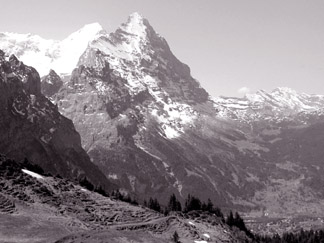|
observer |
|
|
|
|
|
OTHER LINKS |

|

|

|
Rumble in the AlpsHansruedi Burgener has welcomed up to 800 people a day - twice the average number of visitors - to his remote mountain hostel in the Alps, this summer.
"We would also have made a living without the rock coming down. But it would have been a bit quieter," Burgener said. Accessible only by a steep hike of more than an hour, Burgener's place offers a safe view of the crumbling rock right opposite, and refreshments like a cold beer. Every few minutes or so, there is a surprisingly loud sound as a boulder comes thundering down, sending a cloud of dust into the air. The sharp crackle of smaller stones rolling down the cliff face is almost continuous. The spectacle is a dramatic reminder that the Alps have been hit hard by global warming, and underscore warnings from scientists that thawing permafrost - the frozen soil that can glue mountains together - will cause more havoc in the future. Glaciers in the Alps may have lost up to a tenth of their volume in the hot 2003 summer alone, researchers at Zurich university have said, and the ice now only occupies between half and a third of its volume in 1850. A further increase in temperatures of only 3 degrees Celsius could make another 80 percent of glacier ice disappear by the end of the century, their study warned, threatening farmers, villages and tourists. Rock Solid?Rising temperatures are at least part of the reason why the 5 million tonnes of rock are slowly sliding off the Eiger - one of Switzerland's most legendary peaks, whose infamous North Face has claimed the lives of dozens of climbers. "It's got to do with the retreating of the glacier, which at least partially is caused by global warming," said geologist Hans Rudolf Keusen, whose company Geotest has been ordered by authorities to monitor the Eiger rockslide. A series of sometimes fatal accidents among climbers has been blamed on increasingly unstable conditions on lofty slopes and ridges. Swiss media have even started pondering the endurance of the snow-capped mountains which define the nation's identity. Keusen is more cautious. "The Alps are not falling apart. Not that quickly anyway," he said. Huge rockslides took place in the Alps long before there were any signs that world temperatures were rising. In 1806, a chunk of mountain 20 times the size of the rock now coming off Eiger, killed 457 people in a valley near the Rigi mountain, wiping the entire village of Goldau off the map in one of Switzerland's worst disasters. A rockslide of over 1 million cubic metres - officially called a landslide by geologists - on average happens every 20 to 50 years in Switzerland, Keusen said. Big BangWhen he opened his cabin for business in June in the heartland of Switzerland's tourism industry, Burgener became the first to notice something moving in the rock on the cliff face opposite. Geologists then saw the rock coming down ever faster, reaching a speed of a metre a day. The process has now slowed and the number of visitors is also waning. Helicopters with camera crews and bigger streams of tourists will no doubt return to the hostel when Eiger finally decides to shed the rock, just a tiny chip on the side of its almost 4,000 metres (13,,123 ft) high peak. Nobody can predict when that will be, and some even think the cliff may just slowly crumble into a heap of rubble. Burgener's hopes of making more money seem dulled by his worries about what climate change is doing to this valley. "Anybody can see it. It's going rapidly, with the glacier disappearing, the moraines are getting bigger, the streams coming down are enormous. And it hasn't rained, it's all melt water," the former mountain guide said. He should know. His brand new cabin was built only this year - after a mudslide swept the ground from under his old place just a few hundred metres away. (Reuters) |
 They all hope to watch a rock the size of two Empire State Buildings
collapse onto the canyon floor up to 200 m (656 feet) below, as
retreating glacier ice robs a cliff face on the eastern edge of the
Eiger mountain, of its main support.
They all hope to watch a rock the size of two Empire State Buildings
collapse onto the canyon floor up to 200 m (656 feet) below, as
retreating glacier ice robs a cliff face on the eastern edge of the
Eiger mountain, of its main support. 







